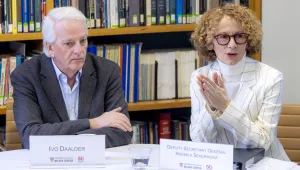
Introduction
As recently as 18 months ago, many policymakers, academics, and pundits in the United States and Europe were waxing lyrical about the geopolitical benefits of the coming transition to cleaner, greener energy. They understood that the move away from a carbon-intensive energy system that relied on fossil fuels was going to be difficult for some countries. But on the whole, the conventional wisdom held that the shift to new sources of energy would not only aid the fight against climate change but also put an end to the troublesome geopolitics of the old energy order.
Such hopes, however, were based on an illusion. The transition to clean energy was bound to be chaotic in practice, producing new conflicts and risks in the short term. By the fall of 2021, amid an energy crisis in Europe, skyrocketing natural gas prices, and rising oil prices, even the most optimistic evangelist of the new energy order had realized that the transition would be rocky at best. Any remaining romanticism evaporated when Russia invaded Ukraine in February 2022. The war revealed not only the brutal character of Russian President Vladimir Putin’s regime and the dangers of an excessive energy dependence on aggressive autocracies but also the risks posed by a jagged, largely uncoordinated scramble to develop new energy sources and to wean the world off old, entrenched ones.
One result of this turmoil has been the revival of a term that had come to seem anachronistic during the past two decades of booming energy supplies and utopian visions of a green future: energy security. To many Americans, that phrase is redolent of the 1970s, conjuring images of boxy sedans and wood-paneled station wagons lined up for miles, waiting to fill their tanks with gasoline at sky-high prices thanks to the Arab oil embargo of 1973 and the Iranian Revolution of 1979. But energy security is hardly a thing of the past: it will be crucial to the future.
O'Sullivan, Meghan and Jason Bordoff. “The Age of Energy Insecurity: How the Fight for Resources Is Upending Geopolitics.” Foreign Affairs, April 10, 2023
The full text of this publication is available via Foreign Affairs.





